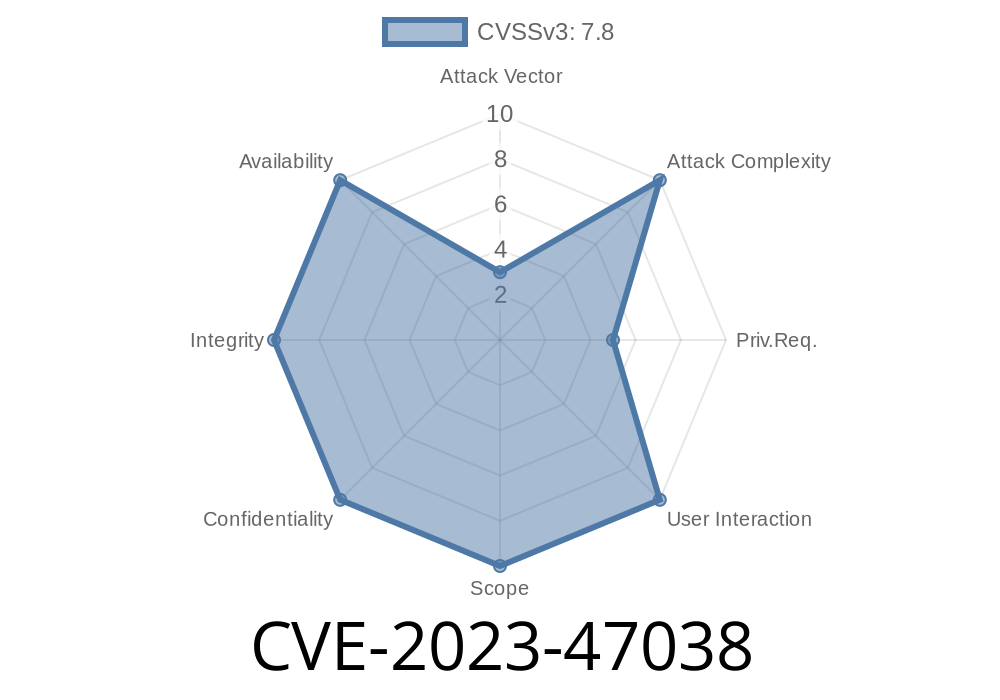The security community is always on its toes for new exploits in longstanding tools—and Perl, the adaptable and scriptable language, is no exception. In late 2023, the vulnerability CVE-2023-47038 was discovered, affecting Perl’s handling of certain regular expressions. This guide will break down what it is, how it can be exploited, and what you can do to stay safe—all in plain, simple terms.
What Is CVE-2023-47038?
CVE-2023-47038 is a security bug found in Perl’s regular expression engine. When Perl compiles certain specially crafted regular expressions, it fails to check some boundaries, causing it to write more bytes into memory than it should. Specifically, it writes attacker-controlled data beyond the end of a buffer that's been allocated on the heap—a classic heap buffer overflow.
This bug can allow an attacker to execute malicious code, crash the Perl process, or even possibly gain further control depending on the context.
Affected Software: Perl (all versions prior to the fixed release)
- Attack Vector: Malicious / crafted regular expression patterns parsed by Perl
A Closer Look: Technical Detail
The problem occurs during regex pattern compilation in Perl’s core. When dealing with certain regular expression features, Perl can miscalculate how big a buffer it needs and fail to check the end while writing. An attacker could exploit this if they control the regular expression pattern (for instance, via user input).
Here’s a simplified pseudo-code to help understand
// Pseudo-code of the vulnerable logic in Perl's regex compiler
char *buffer = malloc(expected_size);
for (i = ; i < input_length; i++) {
// This loop writes bytes to the 'buffer' based on regex parsing
buffer[j++] = input[i]; // j increments, but may go past 'expected_size'
}
If input_length is larger than expected_size, the write goes past the end—potentially overwriting important data on the heap, or otherwise opening the door for further exploitation.
Exploit Scenario
Let’s imagine a Perl web application that takes user input and processes it as a regular expression:
# BAD CODE: takes user-supplied regex without validation
my $pattern = param('user_regex');
if ($input =~ /$pattern/) {
print "Match!";
}
If that app is running a vulnerable version of Perl, a clever attacker can craft a regular expression that will trigger the buffer overflow inside Perl itself. What happens depends on system protections and how Perl is being used, but at the very least, this could crash your application; at worst, it could give an attacker a foothold in your system.
Proof of Concept:
Security researcher Max Justicz released insights and a crafted regex that can trigger the bug.
Here’s a simplified version
# This input causes heap corruption on vulnerable Perl
my $evil_regex = "(" x 500 . "a" . ")" x 500;
"something" =~ /$evil_regex/;
The pattern is designed to cause the regex compilation to miscalculate buffer size and overflow allocated memory.
References and Original Advisories
- CVE Details - CVE-2023-47038
- Perl Security Advisory
- oss-security Notice and Initial Report
- Upstream Patch Discussion
Update Perl to the latest stable version.
The Perl team has patched this issue; check your package manager or Perl’s main site for updates.
Final Thoughts
CVE-2023-47038 is a reminder that even mature programming languages can have serious vulnerabilities lurking in their legacy code. Always enforce good security practices and keep your tools up to date. If you use Perl, especially in web apps or services exposed to untrusted users, patch immediately and sanitize all user input.
Stay safe and code wisely!
*Written exclusively for you by ChatGPT. For any further deep dives or questions, let me know!*
Timeline
Published on: 12/18/2023 14:15:08 UTC
Last modified on: 02/05/2024 07:15:08 UTC
